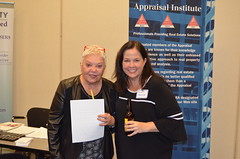Monthly Archives: December 2013
AARO Fall Conference-The Third in a Three Part Series
On behalf of ICAP Karen Emerle, SRA attended the Association of Appraiser Regulatory Officials (AARO) Fall Conference, where discussions included reciprocity, USPAP updates, mandatory background checks, and more. This article is the third in a three-part series summarizing the four days of regulatory discussions that will impact the future of real estate appraising.
The Association of Appraiser Regulatory Officials (AARO) has a new mission statement and updated Bylaws, which were adopted October 2013. According to their website, www.aaro.net, their mission is to improve the administration and enforcement of real estate appraisal laws in member jurisdictions.
This year’s fall conference held October 19-22, 2013 at the Westin Hotel, Washington D.C. was attended by representatives from the ASC, AF, ASB, AQB, APB, AMCs, Members of the Conference of State Bank Supervisors, AI, IAAO, Farm Credit Mid-America, and the NC Deputy Director and Legal Counsel. Topics of discussion at the conference included:
- Federal Updates;
- Background Checks-Alternatives to the FBI;
- AMC Registration and Regulation Issues;
- USPAP Update for Regulators;
- Experience Training Concerns;
- Differing Terminology, Expectations and Requirements in Review Appraisal;
- A Town Hall covering a potpourri of topics and issues impacting the Appraiser Regulatory Agencies;
- Experience Training Today and Beyond; and
- Enforcement-Hearing Preparation.
Additionally, time was allocated to various committee meetings and closed sessions related to specific job functions of investigators, attorneys, board members, administrators and AMCs.
Part Three- Appraisal review, third party oversight, experience training, the Real Property Appraiser Qualification Criteria (effective January 1, 2015), & Enforcement and Hearing Preparation.
A Town Hall Discussion moderated by Danitra Koukounakis included topics including; complaints against Board Members, legal counsel, reciprocity from the enforcement side, resources, politics, and jurisdiction, license classifications, AQB instructor standings, and a discussion of what it means to be in “in good standing.”
Issues relating to appraisal review were presented by Frank O’Neill (DataQuick), Tim O’Brien (RELS), and Danny Wiley (LSI-LP). Topics discussed included: When is it an appraisal review and when does a review have to be done? The conversation involved a range of activities and terms, such as Administrative Review, Field Review, Technical Review, Quality Control, Desk Review, Standard 3 Review, Audit, and Appraisal Review. It included what can be done by a person who is not an appraiser, and what must be done by a licensed appraiser.
During the conference The Consumer Financial Protection Bureau (“CFPB”) Bulletin 2012-03 was discussed. The CFPB Bulletin 2012-03 indicates that supervised banks and nonbanks are expected to oversee their business relationships with service providers in a manner that ensures compliance with Federal consumer financial law, which is designed to protect the interests of consumers and avoid consumer harm.
The CFPB expects supervised banks and nonbanks to have an effective process for managing the risks of service provider relationships. The CFPB will apply these expectations consistency, regardless of whether it is a supervised bank or nonbank that has the relationship with a service provider. To limit the potential for statutory or regulatory violations and related consumer harm, supervised banks and nonbanks should take steps to ensure that their business arrangements with service providers do not present unwarranted risks to consumers. These steps should .include, but are not limited to:
- Conducting thorough due diligence to verify that the service provider understands and is capable of complying with Federal consumer financial law.
- Requesting and reviving the service provider’s policies, procedures, internal controls, and training materials to ensure that the service provider conducts appropriate training and oversight of employees or agents that have consumers contact or compliance responsibilities.
- Including in the contract with any service provider clear expectations about compliance, as well as appropriate and enforceable consequences for violating any compliance-related responsibilities, including engaging in unfair, deceptive, or abusive acts or practices.
- Establishing internal controls and on-going monitoring to determine whether the service provider is complying with Federal consumer financial law; and
- Taking prompt action to address fully any problems identified through the monitoring process, including terminating the relationship where appropriate.
Click to read the entire Bulletin (2012-03) written by the The Consumer Financial Protection Bureau (“CFPB”). Click here:
The panel for the topic Experience Training Today and Beyond, included Greg Stephens-Metro West Appraisal, Tony Pistilli-Axios Valuation Solutions, Alan Hummel-Forsythe Appraisal, and Cassandra Karinen-Metro West Appraisal. The discussion included a brief history of training programs from “pre-FIRREA” to the current and proposed minimum criteria set by the AQB, and the supplemental requirements that are being implemented by individual States.
The panel reminded the attendees that effective January 1, 2015 all individuals with a position of Supervisory Appraiser and Appraiser Trainees must meet or exceed the applicable minimum AQB Criteria including being required to complete a Supervisory/Trainee Appraiser course prior to being supervised or supervising an appraiser trainee. Click here to read the Supervisory Appraiser / Trainee Appraiser Course Education & Q & As including Objectives and Outline issued by the Appraisal Foundation.
Additionally, it was noted that beginning January 1, 2015 the Real Property Appraiser Qualification Criteria states “Supervisory Appraisers may not supervise more than three Trainee Appraisers at any one time, unless a state program in the licensing jurisdiction provides for progress monitoring, supervisory certified appraiser qualifications, and supervision and oversight requirements for Supervisory Appraisers.”
The panel indicated that there is an aging of the experienced appraiser population, and the statistical data from The Appraisal SubCommittee reveals the number of appraisers continues to decline. The report indicated that about 4% of appraisers leave the industry annually with only about 1% entering the industry annually. The panel indicated that there are barriers to entry into the appraisal profession including:
- Current and upcoming federal regulations;
- States supplemental requirements;
- A Bachelor’s degree or higher from an accredited college or university;
- Plus 175 hours of additional education hours;
- Certified Residential and Certified General Classifications from 2,000 to 2,500 hours, and from 2,000 to 3,000 hours, respectively;
- The reluctance of appraisers to take on a trainee;
- The economics of low starting wages compared to other professional degree programs; and
- Additional industry issues including increasing turnaround times and Scope creep.
To read the entire report titled Experience Training – Today and Beyond click here.
Training qualification criteria is established by AQB, and State appraiser regulatory agencies are required to implement real property appraiser licensing and certification requirements that are no less stringent than those issued by the AQB in the Real Property Appraiser Qualification Criteria. According to the Real Property Appraiser Qualification Criteria (effective January 1, 2015), a Real Estate Trainee Appraiser does not require any experience, however, does requires that the training supervisor be certified, in good standing and accept responsibility for the training, guidance, and direct supervision of the Appraiser Trainee by:
- Accepting responsibility for the appraisal report by signing and certifying the report complies with USPAP;
- Reviewing and signing the Appraiser Trainee appraisal reports; and
- Personally inspecting each appraised property with the Appraiser Trainee until the supervising appraiser determines the Appraiser Trainee is competent, in accordance with the Competency Rule of USPAP for the Property Type.
Some States require supervision be through the entire training period. The panel, however, encouraged the States to revise the statutes to be “competency” based, and also recommend a “fast track” for advanced trainees.
North Carolina Deputy Director Tom Lewis and Roberta Ouellette, Legal Counsel discussed Enforcement and Hearing Preparation. The process from Probable Cause to Hearing was described from the perspective of the investigator and the Board Attorney. The discussion gave the audience a summary of the typical “flow of events”, which include:
- Complaint
- Response
- Investigation
- Preliminary Findings
- Hearing
- Decision
- Concentration
- Action
The report made note that areas of concentration in the “flow of events” include the Preliminary Findings and Hearing. In addition, and among other things, the discussion provided appraiser “tips” for proper composure during Cross Examination:
- Don’t allow the questioner to put words in your mouth;
- Don’t answer a compound question;
- Do not try to fill a silence;
- Pay no attention to the questioner’s tone or attitude;
- Keep your temper; and
- Always glance at your attorney before answering the question to see if he or she is going to object to the question.
This article concludes the third in the three-part series summarizing the four days of regulatory discussions at Association of Appraiser Regulatory Officials (AARO) Fall Conference held October 19-22, 2013 at the Westin Hotel, Washington D.C. As always ICAP will continue to keep its membership informed on issues that have the potential to impact the appraisal profession.
~ Karen T. Emerle, SRA
ICAP’s Political Action Fund
ICAP-PAC, ICAP’s Political Action Fund collects contributions from members and uses those funds to help elect candidates for public office who are supportive of appraiser related issues.
Your annual membership dues are essential to ICAP remaining a strong political activist for appraisers in the State of Illinois. Thank you for your continued support and please do not forget to donate to ICAP’s PAC this year when you renew your membership.
To login and renew online or become a new member click here.
November Illinois State Appraisal Board Meeting Posted on You Tube
To view the November Illinois State Appraisal Board Meeting click the following links:
Part 1:
Part 2:
Still time to comment on the Appraisal Foundations White Paper on Alternative Valuation Products
There is still time to Comment on the Appraisal Foundations Draft White Paper-Alternative Valuation Products and the Uniform Standards of Professional Appraisal Practice.
The paper describes an Alternative Valuation Product (AVP) as a product that communicates an opinion of value (or price) other than a “traditional” appraisal. In the residential mortgage valuation sector, this means something other than an appraisal developed and reported using “standard” Fannie Mae/Freddie Mac appraisal report forms.
The (Draft) White Paper notes that because it is possible that an AVP complies with USPAP, it is possible that a state licensed or state-certified appraiser can perform AVP’s, it also states that if an AVP does not allow for compliance with USPAP, a state-licensed or state-certified appraiser may be able to perform the assignment; however, that is based on the state law where the appraiser is credentialed.
Several states have already implemented specific legislation that address AVPs. The State of Nevada allows a a real estate broker/salesperson to perform a BPO for the purpose of listing/selling a property; however, if a real estate broker/salesperson prepares a BPO for any reason other than listing and selling a property and receives compensation they have violated Nevada Revised Statues 645C. This is because Nevada is a mandatory licensing state which requires anyone who provides an opinion of value (or market value) on any real property located in the State of Nevada to first obtain a license or certification.
ICAP will keep you updated as the State of Illinois develops its stance on Alternative Valuation Products.
Click the following to read the white paper on Alternative Valuation. All interested parties are encouraged to comment in writing to TAFcomments@appraisalfoundation.org before December 31, 2013.
Credential Upgrade Worksheet for Illinois Appraisers
The Illinois Department of Financial and Professional Regulation (IDFPR) issued a voluntary Credential Upgrade Worksheet for Illinois Appraisers.
This voluntary worksheet is intended to assist individuals in tracking their progress toward obtaining a Certified Residential or Certified General credential within the state of Illinois.
The worksheet also gives tips for trainees including taking your QE during slowdown periods and if you’re undecided as to whether to track for a Certified Residential or Certified General credential; take the Statistics, Modeling & Finance class, as it is required under both categories.
Click the following link for the Credential Upgrade Worksheet for Illinois Appraisers












